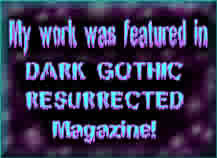So...I'm offering a crash course in horror writing. So all you aspiring horror writers better listen up!
Before we begin, we first must cover...
This is a tricky question, but every good horror writer knows the answer. What one person might find utterly horrifying, another might yawn at. It is the horror writer's job to frighten both the skittish reader and the horrophile-veteran.
So what makes a story scary? How do you define it? What kept you up at night as a child? Do you still remember?
For me, it was Stephen King's story/movie It. My obsession with clowns (or rather, my desire to KILL and EAT them) stemmed from the many weeks I spent beneath my covers, praying and hoping Tim Curry wouldn't slice my throat open while I slept. It was reading Edgar Allan Poe's "The Tell-Tale Heart" in the second grade, and playing Bloody Mary at girl scouts. It was the Brothers Grimm's dark fairytales, Roald Dahl's, "The Land Lady," Ray Bradbury's, "All Summer in a Day," and my early fascination with asian horror movies and comic books. Alfred Hitchcock movies, fantastical Lovecraftian monsters, and the psychological thrillers from Rod Serling's, "Twilight Zone" series, frightened me as a child.
So I'll ask again. What is "scary?"
The answer is surprisingly simple. Amateurs rely too much on the gore and splatter and not enough on the psychology behind fear. Fear is a primal emotion and is universal throughout every culture, nation, and race. Fear is intrinsic to our survival as a species. Tap into those primal reservoirs of the human psyche, and regardless what you write, you're going to scare the shit out of people!
1. Threat of physical harm (death, pain, injury, torture, etc.) or the loss of resources (food, shelter, land, wealth)
2. Isolation or disruption of social bonds (death/injury of a loved one, separation, abandonment, exile, betrayal)
3. No security/control of surroundings/self (the unexplained or unexpected, powerlessness, chaos, vulnerability, etc.)
These three things are at the core of every good horror story. The fundamental hook of your horror plot must strike a chord in one of these primal fears to be effective.
Don't believe me?
Think of some of your favorite horror movies. Recall the underlying "thing" or "characteristic" that was "threatened" or "taken away." 9 times out of 10, I bet that threat tapped into something basic...like personal safety or the helplessness the characters felt about an event beyond their control.
Horror has to be relatable, which is why it MUST be universal.
We've all been frightened by the possibility of bodily harm, or felt the pain from the death or ailment of a spouse or loved one. As children we were terrified when separated from our parents and left alone in a strange and unfamiliar place. But as horror writers, we FORCE our readers to confront the unpleasant. The idea of confronting something unpleasant strikes "fear" in a lot of people. It is what makes the horror genre work.
So we place the murderer in the nursery with the sleeping infant. We maroon the shipwrecks on a desert island populated by ravenous demons. We throw our readers at the edge of a cliff and prod them towards the precipice, we force them into situations a sane person wouldn't want to be in, lol.
Horror is all about psychology. The sooner you learn what the PRIMAL FEARS are, the better you'll be at exploiting them and scaring people.
In Horror Writing 102 I'll discuss the common mistakes new writers make and what you can do to be a successful story-teller!























1 comments:
AGREED!
As I zombie literature fan I've noticed a trend for authors to focus primarily on fight scenes, gore, and explosions. The violence takes front stage and the tension gets pushed to the background, almost an afterthought.
I see it is paramount to build tension, fear, and dread in order to pull the reader into the emotional chaos that one would experience if such a thing as "zombies happening" were to occur. I mean, seriously, not only would there be a breakdown in society, and outright warfare would ensue but it is important to portray the psychological breakdown in order for the reader to relate to the story. That's what makes the difference between a good story and just another "run of the mill".
Post a Comment